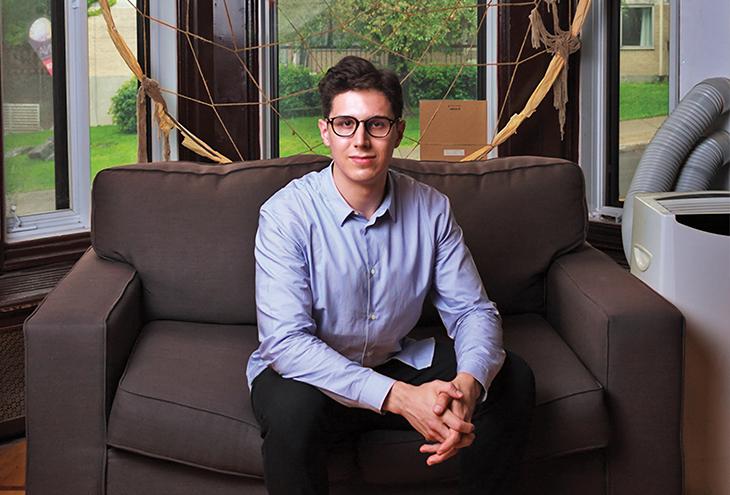Alex Allard has always been interested in biology — and in helping people. So it’s no surprise that these interests shaped his academic studies. His path has not been easy, but having recently graduated from McGill University in Montreal with a major in physiology and a minor in kinesiology, Allard is poised to make his mark.
Allard was born in Montreal, but after his parents separated when he was very young, his mother returned to her family and her roots. She moved herself and her son back to Listuguj, part of the Mi’gmaq reservation in the Gaspé region of eastern Quebec. There Allard’s interest in biomedical sciences flourished, as he spent a great deal of time with his grandmother, a community health representative. When Allard’s mother remarried, he watched his stepfather struggle with back issues. Allard wanted to help and told his stepdad, “Dad, I’m going to fix your back when I’m older.”
Now, he is older, and well on his way to accomplishing his goal. With his recent graduation, Allard can take a moment to look back on his journey, while also looking toward the future. He acknowledges that things have not gone as initially planned. “I started working toward my bachelor’s degree in 2011,” he says. “At the time, I was in a bad relationship, my mental health suffered, and it affected my academics. I didn’t go to class. I slept all day.” As a result, Allard’s grades after his first semester were poor, and McGill asked him to take time off.
For some students, that would have been the end of their academic dreams, but not Allard. He went back home and began helping his mother — a teacher at the community middle school. “That experience helped me reshape my self-confidence in academics,” he recalls. “I just had to do the right things and take the right steps to get myself back on that path — to tell myself that I was cut out to be in school.”
Allard also had the unwavering support of his family, especially his mother. “I don’t think I would have gone back to school if it weren’t for her,” says Allard. His mother’s encouragement to do well academically began at an early age and continued through secondary school. “I can remember in high school and middle school, she was always on my back about my grades,” he says. “As a kid, you can interpret that as nagging, but they’re just trying to make sure you stay along the right path.”
“My involvement in Eagle High Performance Spirit Camp has always kept me in that realm of being interested in biomedical sciences, and also getting Indigenous kids interested in biomedical sciences.”
With the support of his mother — and his entire community — Allard returned to McGill, and excelled. With a new positive attitude, he began to get involved, continuing his association with the Eagle High Performance Spirit Camp, a program that brings Indigenous students to McGill to learn more about the biomedical sciences. Having gone through the program himself, Allard understood fi rsthand the positive impact it could have, and wanted to be part of that. “I’ve turned from participant so many years ago to actually coordinating the camp this past year,” he says. “My involvement in the camp has always kept me in that realm of being interested in biomedical sciences, and also getting Indigenous kids interested in biomedical sciences. That’s something I’ve been very proud of.”
Allard also became involved with the First Peoples’ House, a campus resource focused on supporting Indigenous students. He appreciated the university’s commitment to Indigenous students, and as a result, felt comfortable highlighting his own heritage. “I’m vocal about my culture because I’m proud of where I come from,” he says. This pride and desire to help other Indigenous students led Allard to become one of the founding members of the University’s AISES College Chapter, and to eventually serve as the chapter president.
Looking back on an extraordinary college career, Allard is thankful for his experiences, and excited for the future. “My mom always told me when I was growing up that she was never worried about my not accomplishing something,” he notes. Now a college graduate, Allard has already accomplished much, but he has no plans to slow down. “I want to be involved in working with Indigenous health policy,” he says. “I see Indigenous health policy specifi cally as a fi ght that needs to be fought.” Allard has applied to master’s programs in public health and medicine, and is waiting to hear back.
For now, he is working as an outreach administrator at McGill with the Faculty of Medicine’s Indigenous Health Professions Program and using his story to inspire others. “There were many moments where I could have just given up,” he says. He credits his resilience and determination as well as his family and community with seeing him through tough times. And he doesn’t want others to feel the way he did. “Don’t ever think you’re not cut out for college,” Allard says. “Don’t let that jeopardize your dreams. Our ancestors gave us these tools so that we could perceive the sciences or any other career path from our own perspectives.” He can attest to the fact that if you’re willing to work hard and stay the course, as he says, “everything will fall into place.”













